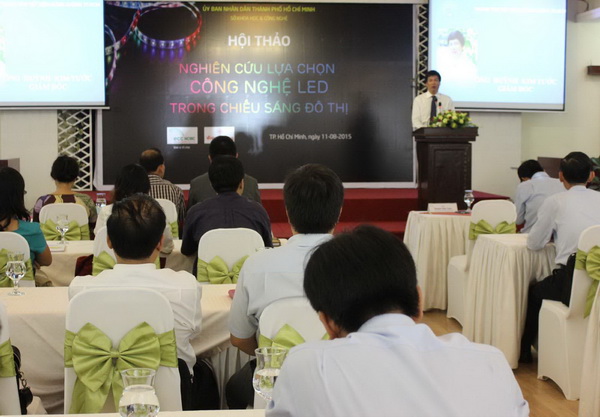On August 11, in HCM City Department of Science and Technology, a workshop on "Research into appropriate LED technology choice for urban lighting" to advise the state to make a choice of LED technology appropriate to urban lighting system.
Currently, electricity consumption for lighting in Vietnam accounts for 35% of total power consumption of the country. The public lighting system is an energy-consuming sector due to the design, installation and use of inefficient lighting.
The major big cities of Vietnam mainly use the high-pressure mercury lamps or high pressure sodium for public lighting system. This lamp consumes electricity, the lighting efficiency is not high and it has low life expectancy. The system of control stations relies mainly on local cabinets and virtually no lighting control devices for the system.

In Ho Chi Minh city, the lighting system consumes more than 162 million kWh/year, including public lighting, accounting for about 90 million kWh/year, an estimation of over VND130 billion/year paid from the city budget. Of the 102,500 public lighting bulbs currently in use, 400W HPS incandescent lamps account for 2.4%, 250W HPS lamps 39%, and HPS lamps from 100 - accounting for 58.5% 150W.
Effective application of LED technology in lighting has been asserted for a long time. However, in a market of various categories, the choice of appropriate LED products and technologies for the urban area needs proper consultation.
The Workshop on "Research into appropriate LED technology choice for urban lighting" not only focuses on analyzing the LED technology in current use in advanced countries such as Japan, Korea, Europe ... but also looks for solutions. According to calculations, if replacing the entire current lighting system using LED, with the capacity of 65 - 200W, HCMC would save 55,315,699 kWh/year, equivalent to about VND 88 billion/year, which would bring down an estimated amount of 31 tons of CO2 emission each year.
Energy saving in public lighting is a problem taking the concern of leaders, departments at all levels. The improvement, the increase of efficiency in urban lighting not only help the City authority save money but also create a safer environment for traffic and create urban aesthetic values.
Trong Tan
